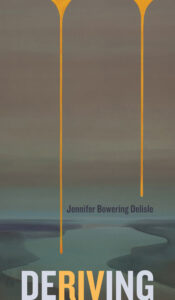By Jennifer Cox
Deriving
by Jennifer Bowering Delisle
University of Alberta Press (2021)
While it is an unusual choice to open a poetry book with a Descartian theory on the birth of worms, it makes an apropos introduction to Jennifer Bowering Delisle’s Deriving. Like a parent trying to answer their child’s question of how babies are made, Deriving searches for rationales for the inexplicable. It is a meandering and meaningful questioning of who we are and where we come from.
Deriving opens with Descartes, who: “thought worms birthed spontaneous/in soil and heat. Sudden maggots in rotting flesh/were proof of God. Until Francesco Redi/placed meat in sealed and open flasks,/watched worms devour skinned frogs” (xi). This opening stanza beautifully encaptures the book’s tension between desperately wanting to know why something happens, and finding that all answers fall short of our lived, indisputable truths. Deriving demands to know why we use the words we do, why pregnancy loss occurred, why family histories are complicated, and why life flows the way it does.
Deriving follows a singular first-person narrator as they start a new family. The first part of the book focuses on devastating pregnancy losses. Grasping for answers, the author looks to gravity, art, pathology reports, and even the weather. In the poem “Vancouver” we hear how the “weather’s not a coincidence … / there’s always loss/running down my windows” (20). In “Reasons,” we wonder if the losses were
caused because “you forgot that at this time of year the cherry blossoms burst their limbs, brash with life, a million pink-tinged follicles. [Because] there’s trash in the hedge, a fly in the dark, a moon in the sky.” (9)
From there, Deriving shakes us out of the depths of loss and moves us, with “houseplants on the back seat” (22) from Vancouver to Alberta. As it moves into the Prairies, Deriving shifts its focus away from forming a family and backwards towards “home in the place it used to be./Here/after the bend” (22). From here, as the narrator ponders where to settle her own roots, we stare straight at her complicated legacy inherited from relatives who spent life in Ponoka, Alberta, “where the grain mirrors the sun/and everyone waits all year for the rodeo” (30).
Once settled in Alberta, Deriving arrives, metaphorically speaking, on the other side. The narrator is again pregnant, and ultimately gives birth to a healthy baby, who turns into a growing child. Deriving then becomes itself like a toddler, desperately wanting to know why everything is the way it is, especially why we use the words we do. She questions the words “mother” (60), “bikini” (55), and “son-of-a-gun” (53). In the poem “Mother” she asks “[h]ow the child who barely talks can name us, how the/ child who barely talks can make us” (60).
Deriving is strongest where it is grounded in place. Vancouver becomes a humid place with “[s]ilverfish surfacing from drains” (10). The narrator is sucked into “muskeg grief” (38) and visits places where “rain is not weather, but geography” (39). Alberta takes on a complicated identity and in “Concession/Stand” Bowering Delisle states “Oh Alberta, yes/you are Strong. Screen muscle glowing in the dark, 3D punch and/ music swells like pockets. Aisle strewn with tubs and cups – Let’s all go to the lobby. Call it butter
but it’s still oil” (57).
The poem “North Saskatchewan,” where the narrator and her baby watch a train cross the North Saskatchewan River on a December day, felt deeply like a grounding landmark. The poem tenderly straddles that cavern between the grief of the past and potential joys of the future. Or maybe, it simply reminded me of my own walk along the North Saskatchewan River in Edmonton, taken with a friend shortly after her miscarriage. It was a bitterly cold day, the two of us discussing the motherhood she
wanted and the enormity of her loss. Bowering Delisile’s words from the poem about the river, “[i]t carries glacial genes from the Icefields./ Snow fed, it knows/ how to be a body in the cold” (46) or “when the days were narrowed,/seconds of light between the black banks/of a northern night” (46) would have been warmly welcomed on that day.
Therein lies the power of Deriving: it meanders and changes focus, but never loses its course and it is happy to bring us along for the ride. At each curve Deriving brings the reader back to its purpose, that search for the unanswerable questions: where do we come from and why? And in the best of ways it fails, just as Descartes did in his explanation of worm births, to find the rationale. Despite this, Deriving reminds us “that we all came from this, here/between hips sharp as knives./Hold your belly/in your mind
like a glass/of light. Hold it/upright.” (45).
Deriving is Bowering Delisle’s second book. Her third book, Micrographia, comes out in Fall 2023.

